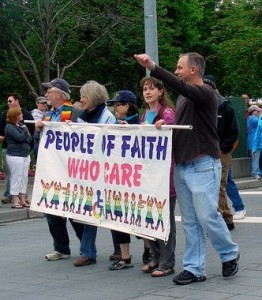The Traditional Values Coalition made some radical claims about the Employment Non-Discrimination Act (ENDA). They base their arguments on the religious aspect of tradition but the claims they make are not very well supported and are flawed. It almost seems like the definition of the act itself is not being understood because of all the claims made against it.
They claim that this act will “[grant] special protection for perverted acts such as incest, pedophilia, and cross-dressing”. This argument is flawed because this act focuses on preventing discrimination based on sexual identity and sexual orientation and saying it grants protection for illegal acts such as incest and pedophilia is neither here nor there. These acts are illegal and endanger the well-being of people while sexual orientation harms no one. Their claim is outrageous because they make a correlation out of the blue between sexual orientation and incest and pedophilia. They provide no evidence that supports their correlation.
They also claim that “this fight is not about job discrimination; it’s about forcing Christians and Americans to affirm transgender sexual conduct and other perverted lifestyles”. This claim also has flawed logic. ENDA is not forcing anything on anyone; all it is doing is protecting people from being discriminated against based on their sexual orientation. It is in no way forcing any kind of lifestyle on anyone. They also cannot claim that this act is not  about job discrimination. This act wants to protect people from being fired/not hired because of their sexual orientation. It does not force or advertise people to be a certain way. And the fact that their claim calls certain lifestyles perverted weaken their credibility. Even if you don’t agree with something and you’re arguing against it, it doesn’t mean you can’t approach it from a respectful point of view. Insulting a group of people doesn’t make your argument any stronger, it does the contrary.
about job discrimination. This act wants to protect people from being fired/not hired because of their sexual orientation. It does not force or advertise people to be a certain way. And the fact that their claim calls certain lifestyles perverted weaken their credibility. Even if you don’t agree with something and you’re arguing against it, it doesn’t mean you can’t approach it from a respectful point of view. Insulting a group of people doesn’t make your argument any stronger, it does the contrary.
Moreover, they claim that ENDA is “the LGBT lobby’s sinister plan to silence people of faith”. First off, ENDA has nothing to do with people’s faith. It deals with equal opportunity and acceptance towards people of all sexual orientations. If people want to keep whatever faith they have, this act will do absolutely nothing to interfere with it. People can choice what they want to believe in, so why should people be discriminated based on their identity. Also, this act will not silence anyone; it actually promotes free speech because with this act people won’t be afraid of openly being any sexual orientation without being afraid to say anything that might suggest a certain sexual orientation which can potentially fire them.
All in all, they don’t provide any evidence for correlations made, stray away from the definition of the act, are disrespectful in their language and do not provide sufficient explanations to their allegations making their argument flawed.






